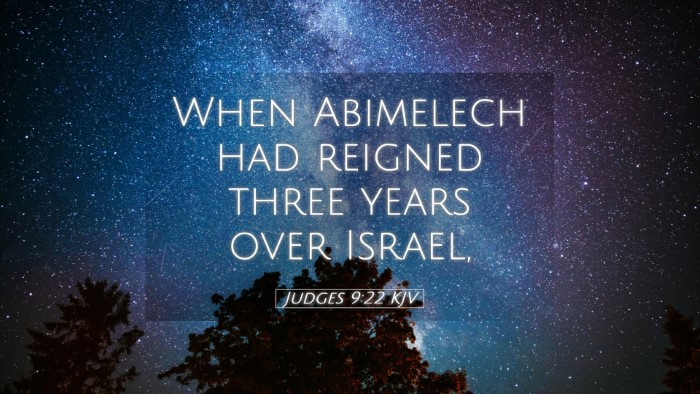Commentary on Judges 9:22
Judges 9:22 states: "When Abimelech had reigned three years over Israel." This verse marks a significant period in the narrative of Abimelech's rule, highlighting the complexities of leadership and the implications of rebellion against God’s divine order.
Contextual Overview
The Book of Judges presents a turbulent time in Israel's history, characterized by cycles of sin, oppression, repentance, and deliverance. Following the death of Gideon, Israel faced instability, which led to the rise of Abimelech, the son of Gideon and his concubine from Shechem. The context of Judges 9 is paramount in understanding the implications of Abimelech’s reign and the theological underpinnings of leadership.
Insights from Matthew Henry
Matthew Henry posits that Abimelech's ascent to power was not divinely sanctioned but arose from betrayal and ambition. He notes that the people of Shechem are complicit in elevating a man whose claim to leadership was founded upon his maternal connection rather than God’s appointment. Henry suggests that this serves as a cautionary tale about the nature of earthly leadership that often lacks divine endorsement.
Furthermore, Henry emphasizes that Abimelech’s rule was marked by tyranny and despotic governance. The fact that he ruled for three years can be seen as a period of testing, both for Abimelech and for Israel, where they experience the consequences of their choice to follow a leader devoid of godly principles. The passage calls into question the legitimacy of rulers who gain authority through deception and violence.
Insights from Albert Barnes
Albert Barnes provides a historical perspective, remarking on the political context of Abimelech's reign and suggesting that it parallels a broader national malaise. Barnes indicates that these years reflect not merely Abimelech’s personal ambition but also a societal shift toward less reliance on Yahweh.
He notes that during these three years, the nation experienced a measure of peace; however, it was a superficial peace, built upon a foundation of corrupt leadership. Barnes argues that this type of governance—characterized by self-interest and treachery—ultimately leads to societal decay and disaster. The implication is that true peace can only be found in adherence to God’s commandments and principles.
Insights from Adam Clarke
Adam Clarke takes a more psychological approach, illustrating the mentality of Abimelech as a ruler who is psychologically burdened by the knowledge of his illegitimacy. Clarke interprets the three years as a time when Abimelech not only consolidates his power but also wrestles internally with his moral standing.
Additionally, Clarke posits that this period was crucial for Abimelech to demonstrate his capabilities as a ruler but was also a time when the character of his leadership began to erode. His dependence on fear and violence rather than wisdom and justice foreshadowed the inevitable downfall that awaits him. Clarke’s commentary insinuates that the divine providence, long-suffering and patient, eventually brings accountability for human choices and leadership failures.
Theological Implications
The reign of Abimelech is a microcosm of the struggle between divine authority and human ambition. Judges 9:22 encapsulates critical themes such as the consequences of poor leadership choices, the impact of societal values on governance, and the patience of God amidst human folly.
-
The Danger of Unqualified Leadership: The verse serves as a stark reminder of the risks inherent in following leaders who are not appointed by God. Abimelech’s rise to power through manipulation is a cautionary example for contemporary readers about the spiritual ramifications of choosing leaders based on personal or political expediency rather than divine endorsement.
-
The Nature of Authority: The text challenges the reader to reflect on the nature of authority and legitimacy. True leadership, according to biblical principles, should align with God's will rather than human ambition.
-
The Consequences of Rebellion: The choice of Israel to follow Abimelech signals their rebellion against God's order, which was ultimately a factor contributing to the chaos and instability that follows.
Conclusion
Judges 9:22 serves as an enduring lesson for leaders and followers alike. It calls for introspection regarding the criteria by which leaders are chosen and the broader implications of such decisions. Through the lens of public domain commentaries, we gather that Abimelech’s leadership represents both a theological and moral crossroads for Israel—a turn away from Godly principle toward autonomy and self-serving governance, ultimately leading to dire consequences. This verse invites pastors, students, theologians, and scholars to ponder the weighty responsibility of leadership and the imperative of seeking God’s direction in all governance.


